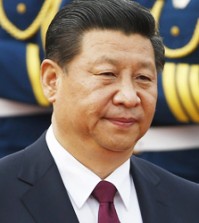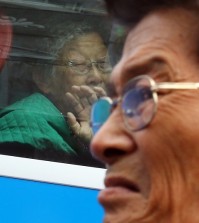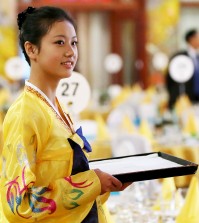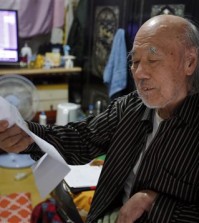- California Assembly OKs highest minimum wage in nation
- S. Korea unveils first graphic cigarette warnings
- US joins with South Korea, Japan in bid to deter North Korea
- LPGA golfer Chun In-gee finally back in action
- S. Korea won’t be top seed in final World Cup qualification round
- US men’s soccer misses 2nd straight Olympics
- US back on track in qualifying with 4-0 win over Guatemala
- High-intensity workout injuries spawn cottage industry
- CDC expands range of Zika mosquitoes into parts of Northeast
- Who knew? ‘The Walking Dead’ is helping families connect
Koreas agree to hold reunions as scheduled
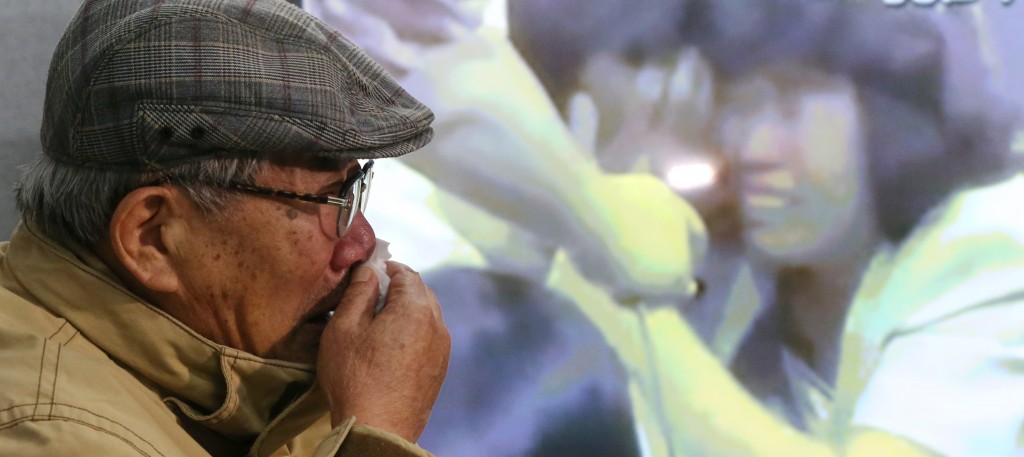
S. and N. Korea agreed Friday to hold family reunion programs starting next week as scheduled. (Yonhap)
By Chung Min-uck
South and North Korea agreed Friday to hold family reunion programs starting next week as scheduled in a deal struck following high-level inter-Korean talks.
“There was a disparity of opinions between the South and the North but following extended hours of sincere talks, we have agreed to hold the family reunions according to the plan,” Kim Kyou-hyun, South Korea’s chief delegate and vice chief of the presidential National Security Office, told a press conference after the meeting at the border village of Panmunjeom, adding that the two sides also agreed to cease slanderous remarks and verbal attacks against each other.
“It is meaningful that the two Koreas took the first step toward the development of inter-Korean relations based on confidence,” Kim said. “I expect us to continue to build confidence through dialogue in the future.”
The chief delegate also said another round of high-level talks will be held at a later date to discuss mutual interests.
Experts say the last-minute agreement to push forward the reunions as originally planned will help the two Koreas build momentum toward reconciliation after years of war-like tension.
South-North relations have been at an impasse following the two-year-old Kim Jong-un regime’s series of military provocations including a third nuclear test in February 2013 and two long-range missile launches in 2012.
The execution of Jang Song-thaek, Kim Jong-un’s uncle and a former political heavyweight, in December also fueled tension on the Korean Peninsula with Seoul strengthening its military posture against Pyongyang by announcing a tailored military strategy exclusively targeting the North in upcoming joint drills with Washington.
The North has historically taken provocative action to divert attention from internal issues.
Lately, Seoul and Pyongyang have locked horns over joint South Korea-U.S. military exercises that partly overlap with the reunions slated for Feb. 20 to 25. The drills kick off Feb. 24.
During their first high-level meeting held Wednesday, Pyongyang demanded the postponement of the exercises until after the reunions. But the allies rejected the request, insisting that family meetings were a humanitarian issue that cannot be linked to military matters.
“We have fully explained to the North our principle of not linking the two and that the reunions must be held as planned to build mutual trust,” said Kim, when asked how he persuaded the North. “The North dropped its objections to the military drills although there is a two-day overlap.”
The Stalinist country has reacted sensitively to South Korea-U.S. joint military exercises for decades, condemning them as a rehearsal for invasion. Seoul and Washington have insisted the annual exercises are defensive in nature and have nothing to do with attacking the North.
Meanwhile, the Ministry of Unification, which handles inter-Korean affairs, said Friday they will send another advanced party of officials, Saturday, to Mt. Geumgang on the North’s eastern coast where the reunions are to take place.
Thousands of Koreans remain separated after the Korean War ended in a cease-fire, not a peace treaty.
Family reunions are a pressing humanitarian issue on the divided peninsula, as most of the concerned people are in their 70s and 80s, and wish to see their long-lost relatives before they die.







